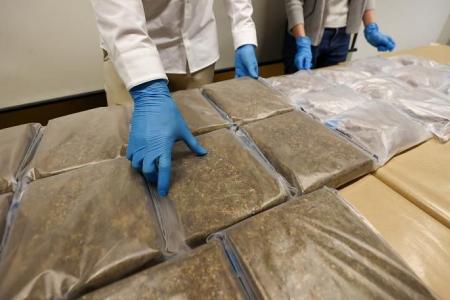Worrying increase in young, female drug abusers in 2023
More than half of new drug abusers arrested in 2023 were below the age of 30, with figures from the Central Narcotics Bureau (CNB) showing an increase in the use of illegal substances among women and the young.
Official figures released on Feb 14 showed the number of drug abusers arrested in 2023 was up by 10 per cent to 3,101, as compared with 2,826 arrested in 2022.
Of those arrested in 2023, 944 were new drug abusers, an 18 per cent increase from 802 in 2022.
More than half of the new abusers arrested were below the age of 30. Among them were five 14-year-olds, who were the youngest abusers to be arrested.
In a release, CNB director Sam Tee said: “We are very concerned that drug abuse seems to be starting at a much younger age... we are also seeing more female abusers.”
In total, 454 female drug abusers were arrested in 2023 as compared with 408 in 2022. Among the new abusers in 2023, 182 were female, as compared with 171 in 2022.
The number of cannabis users arrested was also the highest in a decade, jumping by 17 per cent to 277 in 2023, from 236 in 2022.
Mr Tee said liberal attitudes towards drugs globally have shifted public attitudes in Singapore.
He said: “The global drug situation is worsening. More drugs are being produced and more countries are taking a softer approach towards drug control.
“Lobbying by drug producers and other groups with a similar interest to liberalise the drug regime, through well-funded marketing campaigns, has also shifted public attitudes towards ‘softer’ drugs such as cannabis, and the misperception that these drugs are harmless.”
The 2022 Health and Lifestyle Survey conducted by the Institute of Mental Health found that the mean age of onset of drug abuse in Singapore was 15.9 years, with 41.8 per cent of abusers saying they started taking drugs before the age of 18.
Many had consumed the drugs at home or at their friend’s home.
The National Drug Perception Survey 2023 conducted by the National Council Against Drug Abuse (NCADA) found that 23.8 per cent of youth here either thought drug-taking was fine as long as it did not harm others, or were ambivalent about it.
While 90.4 per cent of youth felt drug taking should remain illegal in Singapore, only 79.3 per cent of them agreed when asked the same about cannabis.
Mr Tee said: “Our youths are constantly exposed to liberal drug ideas and misinformation about the harms of drugs. Parents should have early conversations with their children about such, and guide them towards leading a healthy, drug-free life.”
CNB said advocacy by pro-cannabis groups, including those with commercial interests, touts cannabis as a natural remedy for a wide array of health conditions to diminish perceptions of its harm and increase its use.
The global shift in public attitudes has led to more countries legalising the use of cannabis, such as in Thailand and some states in the United States, it added.
However, the government in Thailand recently announced a roll-back of its policy because of widespread cannabis abuse that saw those under 18 being exposed to cannabis and subsequently experimenting with other drugs.
CNB seized some $15.37 million worth of drugs in 2023 in Singapore, a slight decrease from the $16.66 million in 2022.
It also dismantled 25 drug syndicates, including those that used the Telegram messaging platform to peddle their wares to young people.
The number of repeat drug abusers arrested in 2023 increased by 7 per cent to 2,157, from 2,024 in 2022.
Mr Tee said despite the worrying trends, the drug situation in Singapore remains under control.
He added that preventative drug education is a key component of CNB’s strategy.
He said: “CNB will be relentless in the fight against drugs. We will continue our preventive drug education programmes and our tough enforcement stance.
“However, we cannot stem the tide alone but need the support of the public, especially parents.”
Get The New Paper on your phone with the free TNP app. Download from the Apple App Store or Google Play Store now


